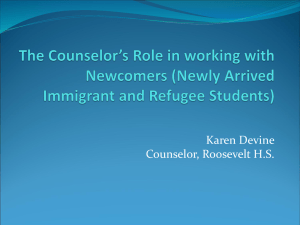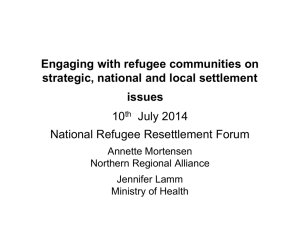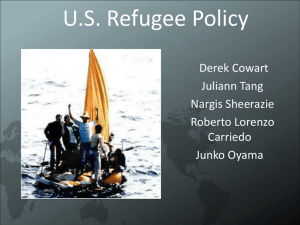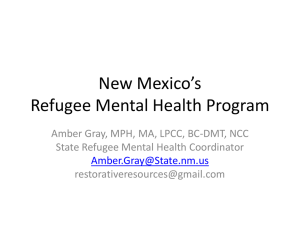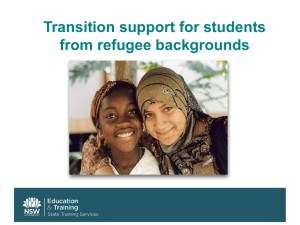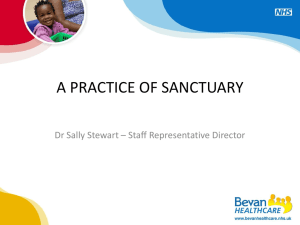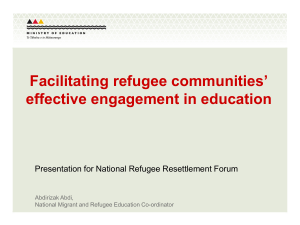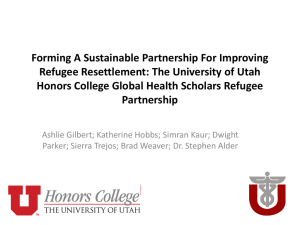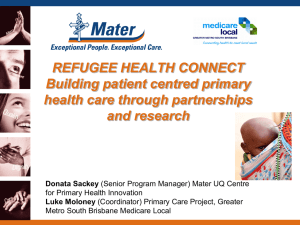Presentation - University of East London
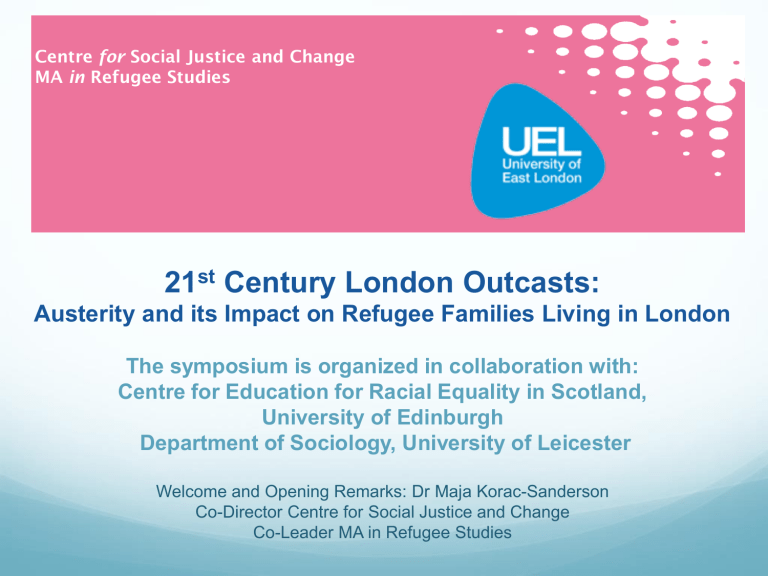
Centre for Social Justice and Change
MA in Refugee Studies
21
st
Century London Outcasts:
Austerity and its Impact on Refugee Families Living in London
The symposium is organized in collaboration with:
Centre for Education for Racial Equality in Scotland,
University of Edinburgh
Department of Sociology, University of Leicester
Welcome and Opening Remarks: Dr Maja Korac-Sanderson
Co-Director Centre for Social Justice and Change
Co-Leader MA in Refugee Studies
Centre for Social Justice and Change
MA in Refugee Studies
21’st Century London Outcasts
Welfare Reform and Their Impacts on
Refugee Families Living in London
Indira Kartallozi
Director
Chrysalis Family Futures
February 5, 2014
"Here in a country rich beyond description there are people poor beyond description ”
(Will Crooks,
Labour MP 1908)
‘21
st
Century Welfare’
Benefit Cap
Universal Credit
Bedroom Tax
Abolishing of Council Tax
Benefit, Crisis Loan and
Community Care Grants
Disability Living Allowance replaced by Independent
Personal Payment
51% refugee unemployment rates in
London (Bloch 1999)
64% of refugees are unemployed (Welsh
Refugee Council 2013)
Extreme and high levels of poverty
High unemployment
High welfare dependency
Poor and unaffordable housing
Poor mental and physical health
Social exclusion
Hostility and exploitatio n
Household 1: Unemployed husband, wife and three children, aged 7, 15 and 18.
“ I need to work, I’m not a person who stays still… I’m a person who want to work hard .” (Refugee interview)
Pre Benefit Cap:
Income
Rent
£630 pw
£345 pw
£285 pw
Post Benefit Cap:
Income £499 pw
Rent
£345 pw
£154 pw
A couple and two children (11 and
6) placed in two bedroom - poor standards and high rent:
Income:
TA* Rent:
£570 pm
£1499 pm
LHA* Rates: £1023 pm
“We have now a whole new group of families, including migrant families, who have access to public funds but because of the cap they have become ‘intentionally homeless’”. (Expert interview)
* Temporary Accommodation
*Local Housing Allowance
“Broken down by ethnic background, our main group in
Brent is Somali…because they are precisely the type of people that need family-sized accommodation .”(Refugee interview)
“We recognize that the council does not take pleasure in placing people outside of
London, but it is actually forced to do it.” (Expert interview)
Mother and two children, survivor of trafficking and sexual exploitation:
“For two months I was without any money or food. I had to feed my children with bread and butter, sometimes moulded bread.
”
“Oh my God… the suffering I went through… so I made a decision that if I don’t receive the benefits by the 30 th ,
I will kill myself.”
35 year old woman and elderly mother:
“Okay, I get the papers now, but waiting ten years! Ten years is TEN YEARS! OF MY
LIFE! (Sobbing) I couldn’t get married, I couldn’t work, study…”
“ …Even in my language I’m stuck to express my feelings, its like I’m dead, I’m dead!
That is it! And I suffer from depression, it got worse and worse with every year going by…”
“Now I have got it and I say thank you, but it’s too late for that. I feel like I have a country, but its not my country; it’s not my choice to be here.” (Refugee interview)
“These people need to integrate, where do they put them, they put them in slum estates. What are they wanting to integrate to, alcoholism, heroin addiction, unemployment…that is the context of them being asked to integrate to!” (Expert interview)
Economic
Exclusion
Hostility
Dispersal
21
st
Century
Outcasts?
High Welfare
Dependency
Multiple
Deprivation
Welfare
Exclusion
Poor Mental
& Physical
Health
When families are granted refugee status, there should be a more efficient transition onto mainstream benefits, avoiding the risks of destitution and severe poverty such as malnutrition.
Social Services should ensure that they adhere to their obligations under the Section 17 of Children Act 1989 and protect refugee children from harm caused by severe poverty and destitution.
Housing Services should provide a support package and information to refugee families dispersed outside of
London and to ensure proper referral to public services in the new area of residence.
Further Research
Extending the sample coverage (number of refugee families in London), as well as the geographical scope of the research beyond London.
The impacts of welfare reforms on refugee integration, including potential increases in equality and hostility.
The likely socio-economic, health and cultural impacts of dispersal of refugee households outside London.
Austerity and Social Justice
Dr. Leah Bassel, University of Leicester
Dr. Akwugo Emejulu,
University of Edinburgh
5 February 2014
How do these findings connect to issues you have observed or experienced?
How would you like to see the findings of this study and outcomes of today taken forward?
